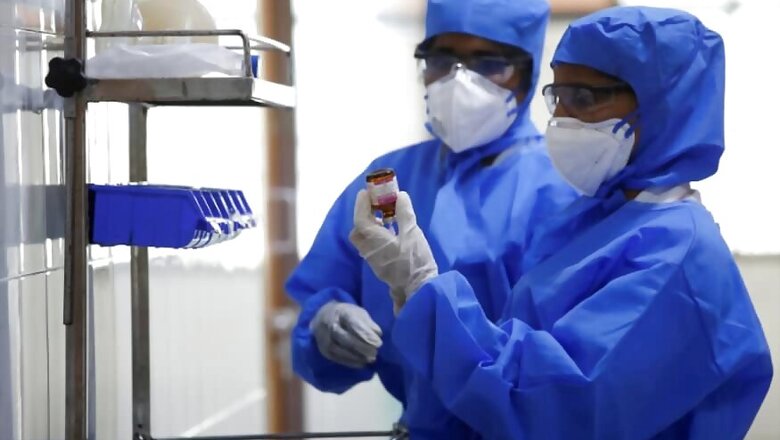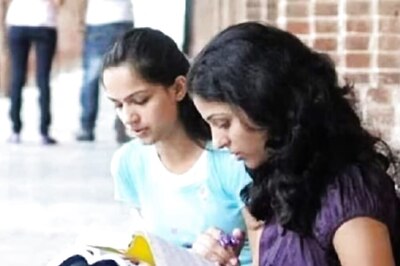
views
There are more than 530,000 confirmed cases of COVID-19 across the world now with over 24,000 deaths. Also, close to 120,000 people have recovered from the disease. About 200 countries and territories have reported cases so far. In India, more than 700 people have tested positive so far, with over 60 having recovered/discharged and the death toll is 17. The country is under a 21-day lockdown after the decision was announced by Prime Minister Narendra Modi on March 24.
So, the novel coronavirus, or SARS-CoV-2, is battering lives as well as economies across he world. And if the pandemic is not contained soon, the results can be catastrophic. A distinctive feature of coronaviruses is that they are zoonotic, meaning they can spread from animals to humans. The SARS-CoV2 is not airborne or waterborne. It spreads through human contact. Which is why governments and health experts have been advising people to maintain social distancing and several countries, including India, have gone into lockdown to break the chain of infection. People across the world have started to follow the traditional Indian way of greeting each other by doing namaste as a substitute for a handshake. While the number of cases is escalating at an alarming rate, different measures are being adopted to contain the spread, at least until a vaccine or cure is found.
Apart from dealing with the unprecedented health crisis, world leaders are also striving to save their economies. Trump believes that the United States is moving towards a recession. Credit rating agency Moody's on Friday slashed its growth forecast for India to 2.5 per cent for the financial year 2020. The human cost followed by the financial crunch have come as a double whammy for governments and the people. Pharmaceutical companies must have learnt a lesson or two from this outbreak and will most likely try to have a more domestic outlook in the future. Other industries have suffered setbacks too, though some like IT firms have tried to minimise the damage by adopting a work-from-home approach.
The nationwide lockdown is in effect and people have been advised to step out only if absolutely urgent. While more developed countries like the United States, China, Italy, etc, have been battered by COVID-19, India has so far managed to stop the spread from going out of control despite a large population, earning global praise.
Global village has become problematic
In these times of rapid globalisation, we can not imagine our lives without depending on other nations. Globalisation is basically the integration of a country’s economy with other economies of the world. It is an established theory that every coin has two sides. There are numerous positive impacts of a globalised world, but we must not ignore the negative aspects of it. In the present scenario itself, the swift spread of the coronavirus is a result of the world being a global village. We are so interdependent that we cannot imagine our existence without one another.
While the virus originated in China, it has spread to some of the remotest parts of the world. It is being termed as one of the worst catastrophes in human history and could be the largest epidemic that has affected the entire world.
A few years ago, similar predicaments had presented themselves with the SARS and swine flu outbreaks. But back then, we had escaped without any major damage. However, this time, the disease is more deceptively contagious and has a higher fatality rate.
Like SARS, COVID-19, by all accounts, originated in China and is believed to have been passed down from bats to humans. The first reported case was in November but China did not inform other parts of the world. Only in January, when it had spread in some parts of the country did the World Health Organization take cognisance, but did not acknowledge the severity of the problem.
It's fair to say that WHO as an international organisation has failed to serve its purpose and let down other countries. It neither asked China to share basic facts of the disease at the early stages nor did it warn the rest part of the world.
China performs a major role in the global supply chain. It serves as a manufacturing hub for many international conglomerates. Thus, China being crippled by the outbreak brings down not only its national economy but also international growth. This cataclysmic pandemic has affected the lives of everyone. Trade and commerce have also been affected. Even the global GDP growth has suffered a setback. So, major economies which are dependent on Chinese goods were already in a crisis when the virus was active in China. After COVID-19 entered those countries, the crunch has worsened.
Time to learn
Mahatma Gandhi's concept of Gram Swaraj (Village Republic) can be interpreted and appreciated in the light of the coronavirus pandemic. He used to say that India's soul lives in its villages. To Gandhi, villages were the basic units of social organisation. Therefore, the villages should be self-sufficient in the matters of their vital requirements. Today, the whole world is struggling to procure basic goods and necessary medical equipment, and hardly a few countries have the stock. Luckily, India has an adequate number of pharmaceutical companies and has made strides in manufacturing and supplies, but it is still dependent on China for raw material. We can see how Europe is struggling or the US is reliant on China for medical equipment. This crisis has taught us a lesson that every country must possess basic amenities for self-survival.
Gandhi’s principle is very relevant here as it stressed on self-reliance at the local level. With globalisation, outsourcing has become a key principle of business. Now this concept will be re-examined in light COVID-19 as it has challenged many assumptions.
The way China is negotiating with the world over medical equipment has lessons in it. The concept of sovereignty is not only limited to territory and military. It has many elements including data and basic life-saving medicines. This pandemic crisis has given a message that we can not outsource basic health services to other countries.
Post COVID-19, the world will be more vigilant and conservative, as international bodies appear incompetent are unable to restrict the mischievous ambitions of some.
(The author is director of Center of Policy Research & Governance. Views expressed are personal.)




















Comments
0 comment